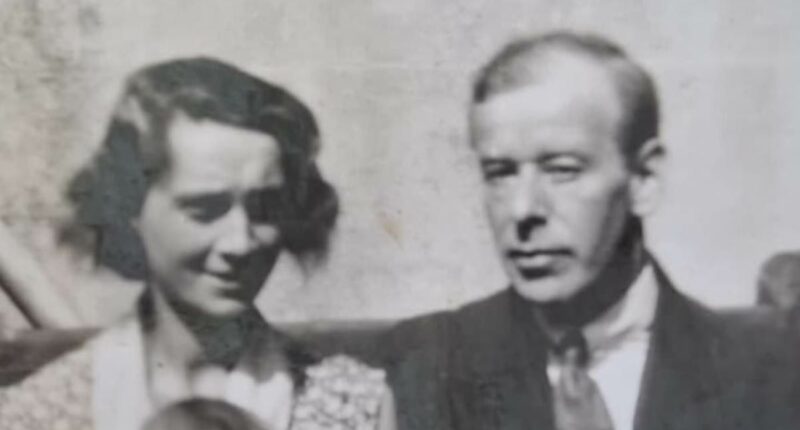Share this @internewscast.com
The rediscovery of a London housewife’s diary has shed light on the grim realities faced by civilians during the Second World War’s Blitz. This personal account, penned by Marion Marden, details the harrowing experiences of enduring Nazi bombings, sleepless nights spent in air raid shelters, and the daily struggle to put food on the table under the constraints of wartime rationing.
This poignant diary came to light during the investigation of the unclaimed estate of Marden’s daughter, Myrta, who passed away in 2019, leaving behind no known descendants or surviving relatives.
Between September 7, 1940, and May 21, 1941, London bore the brunt of relentless bombing raids that claimed the lives of more than 40,000 civilians. These nighttime attacks left a trail of destruction and instilled a pervasive sense of fear and uncertainty across the city.
Through Mrs. Marden’s writings, we gain an intimate glimpse into the ‘new normal’ that defined life during this perilous time. In one entry from February 1941, she captures the chaos and dread: “The children full of vim. Air raid 7.20 pm to 11.30 pm. Four hours of bombing and gunfire. What a night.”
Mrs Marden’s diary reveals the ‘new normal’ of life amid the constant threat of death.
In February 1941, she wrote: ‘The children full of vim. Air raid 7.20 pm to 11.30 p.m. Four hours of bombing and gunfire. What a night.’

An unearthed diary of a London housewife has given fresh insight into the terror of the Blitz in the Second World War. Above: Marion Marden with her daughter Myrta and husband Frank

Her diary was found during an investigation into the unclaimed estate of her daughter Myrta, who died in 2019 with no known descendants or living relatives
The following month, she described the horror of a bombing raid on a dance hall in Palmer’s Green.
‘Raid, gunfire very bad, a lot of damage done and people killed; terrible,’ she recorded on March 15.
More from Harry Howard, History Editor…
‘Dance hall caught it P.G [Palmers Green] We went to bed 12 o’clock. Crowd on bus got killed. Bus no more.’
Mrs Marden, who in 1941 was 47, had two children – son Raymond, 11, and eight-year-old daughter Myrta – with her husband Frank. He was a volunteer in the Home Guard.
The family lived in Southgate, north London. Mrs Marden also had an older son, Albert, who was born in 1920 – nine years before she married Frank.
Researchers at probate and genealogy firm Fraser and Fraser came across Mrs Marden’s diary after being tasked with finding any heirs of her daughter.
Through detailed genealogical work, the team identified living beneficiaries across the UK, France and Australia.
During their research, they discovered references to Mrs Marden’s wartime writing, excerpts of which had been shared by collector Valerie Smith, who bought the diary from a private seller last year.

A postman attempting to deliver letters in a bomb-damaged street near Paul’s Cathedral, May 1941

Mrs Marden with her daughter Myrta, who died in 2019 with no known living relatives
Writing in June 1941, Mrs Marden touched on the subject of food. She said: ‘Butcher brought beef today and I wanted it to be lamb; still we must not forget it is war time and have to put up with what ever we can get.’
Months earlier, she had noted: ‘Raymond made some toast, he is like his dad, always ready to make toast. They forget the butter does not go far war time.’
More than one million houses in London were destroyed or damaged during the Blitz.
Other cities that were hammered included Coventry, Liverpool, Glasgow, Plymouth, Belfast and Southampton.
The bombing campaign came to an end after Hitler had given up on a plan to invade Britain had turned his sights to attacking the Soviet Union.
Although less intense than before, raids did continue though, both in the capital and elsewhere.
Mrs Marden’s diary continued until 1944. On January 2 that year, she wrote an entry that revealed her wish for the fighting to come to an end.
She said: ‘Had to get up as usual and make my own early cup of tea. Myrta bought me some cigarettes good kind. Mrs Burr gave me some cooked roe for breakfast. We had eggs as well.

Mrs Marden’s diary entry on January 18, 1941

Mrs Marden’s diary entry on March 15, 1941, when she recorded: ‘Raid, gunfire very bad, a lot of damage done and people killed; terrible’

Between September 7, 1940 and May 21, 1941, more than 40,000 civilians were killed in wave after wave of bombing raids that struck at night. Above: The bombed house of Commons in December 1940
‘Not heard from Albert yet; I hope he is well. The children full of Vim. We lost 28 planes with men.
‘I wish this war was over. I saw six planes nearly touching the top of houses. Frank has a very bad cold. Did my washing.
At the end of January, she went on: ‘The last day of the month and let’s hope it will [be] nearer the end of this terrible war.
‘I kept the children away from school; they both have colds and the shelters are far too cold for them. Raid warning and planes overhead; guns firing.’
In later life, Mrs Marden moved to Brighton.
Ben Cornish, a case manager at Fraser and Fraser, said: ‘When we began this case, we expected a routine investigation into an unclaimed estate.
‘What we found instead was a personal record of the Blitz from the perspective of an ordinary London family. It is a rare and valuable insight into civilian life during the war.’

















